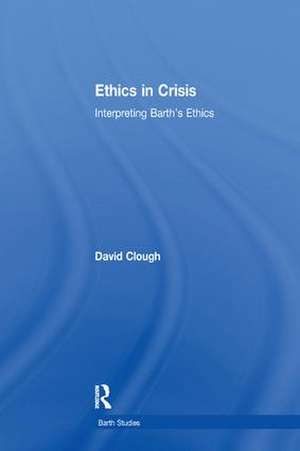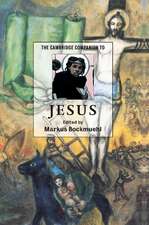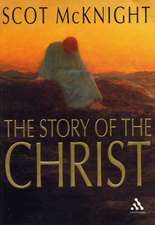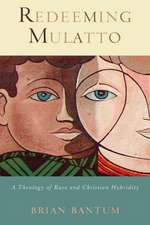Ethics in Crisis: Interpreting Barth's Ethics: Barth Studies
Autor David Cloughen Limba Engleză Paperback – 31 mar 2017
| Toate formatele și edițiile | Preț | Express |
|---|---|---|
| Paperback (1) | 379.75 lei 6-8 săpt. | |
| Taylor & Francis – 31 mar 2017 | 379.75 lei 6-8 săpt. | |
| Hardback (1) | 998.71 lei 6-8 săpt. | |
| Taylor & Francis – 26 aug 2005 | 998.71 lei 6-8 săpt. |
Din seria Barth Studies
-
 Preț: 416.22 lei
Preț: 416.22 lei - 20%
 Preț: 184.81 lei
Preț: 184.81 lei -
 Preț: 389.38 lei
Preț: 389.38 lei - 18%
 Preț: 336.35 lei
Preț: 336.35 lei -
 Preț: 469.34 lei
Preț: 469.34 lei -
 Preț: 469.34 lei
Preț: 469.34 lei -
 Preț: 242.07 lei
Preț: 242.07 lei - 17%
 Preț: 338.33 lei
Preț: 338.33 lei -
 Preț: 469.34 lei
Preț: 469.34 lei -
 Preț: 489.26 lei
Preț: 489.26 lei -
 Preț: 489.26 lei
Preț: 489.26 lei -
 Preț: 469.34 lei
Preț: 469.34 lei -
 Preț: 389.38 lei
Preț: 389.38 lei -
 Preț: 482.62 lei
Preț: 482.62 lei -
 Preț: 381.51 lei
Preț: 381.51 lei -
 Preț: 385.47 lei
Preț: 385.47 lei -
 Preț: 383.71 lei
Preț: 383.71 lei
Preț: 379.75 lei
Nou
Puncte Express: 570
Preț estimativ în valută:
72.66€ • 79.18$ • 61.23£
72.66€ • 79.18$ • 61.23£
Carte tipărită la comandă
Livrare economică 23 aprilie-07 mai
Preluare comenzi: 021 569.72.76
Specificații
ISBN-13: 9781138269743
ISBN-10: 1138269743
Pagini: 164
Dimensiuni: 156 x 234 x 9 mm
Greutate: 0.23 kg
Ediția:1
Editura: Taylor & Francis
Colecția Routledge
Seria Barth Studies
Locul publicării:Oxford, United Kingdom
ISBN-10: 1138269743
Pagini: 164
Dimensiuni: 156 x 234 x 9 mm
Greutate: 0.23 kg
Ediția:1
Editura: Taylor & Francis
Colecția Routledge
Seria Barth Studies
Locul publicării:Oxford, United Kingdom
Recenzii
'David Clough describes and evaluates the ethical thought of Karl Barth clearly, knowledgeably, and originally. He makes a formidable case that the concepts of crisis and dialectic Barth offered in the 1922 version of his Epistle to the Romans remain critical for interpreting the later Church Dogmatics, and for engaging a twenty-first century crisis in theological ethics. Clough's book displays both painstaking scholarship and constructive power. I recommend it heartily.' Gene Outka, Dwight Professor of Philosophy and Christian Ethics, Yale University 'In this book David Clough gives us both a fresh reading of the development of Barth's ethical thought from the second edition of the Römerbrief to the Church Dogmatics, and an original demonstration of the continuity between them. Against those who hanker after human self-sufficiency in ethics - whether by way of postmodernist relativism or rationalist system - Clough re-presents Barth's constant assertion of a salutary, if uncomfortable dialectic: because God does command, there is something that we may hear (and reason from); but because it is God who commands, we should never cease to listen, and to listen again. Clearly and sometimes vividly written, Ethics in Crisis will reward not only the student of Barthiana but anyone who yearns for a theological ethic that takes God seriously.' Nigel Biggar, Professor of Theology, Trinity College Dublin '... this is an excellent book that will quickly become a definite and reliable guide to Karl Barth's ethics. Not only that, it is a fine piece of constructive theology. Clough's work is no mere explication of Barth. It moves beyond Barth and does not simply offer corrections to Barth's work.' Princeton Theological Seminary '... recent addition to Ashgate's excellent Barth Studies series... David Clough's Ethics in Crisis offers both significant contribution to the interpretation of Barth's development, and a sharp and suggestive proposal for our contemporary
Notă biografică
David Stone St John’s College, Durham, UK
Cuprins
Introduction; Part I The Romans II Crisis; Chapter 1 Ethics in Crisis; Chapter 2 Ethics Within the Crisis; Chapter 3 Response to the Romans II Crisis; Part II Crisis Beyond Romans II; Chapter 4 From Romans to the Dogmatics; Chapter 5 The Place of Ethics in the Dogmatics; Chapter 6 Love and Community in the Dogmatics; Chapter 7 War, Peace, and Revolution in the Dogmatics; Part III Re-Reading Barth’s Ethics; Chapter 8 Interpreting Barth’s Ethics; Chapter 9 Barth’s Ethics Today;
Descriere
Ethics in Crisis offers a constructive proposal for the shape of contemporary Christian ethics drawing on a new and persuasive interpretation of the ethics of Karl Barth. David Clough argues that Karl Barth's ethical thought remained defined by the theology of crisis that he set out in his 1922 commentary on Romans, and that his ethics must therefore be understood dialectically, caught in an unresolved tension between what theology must and cannot be.














